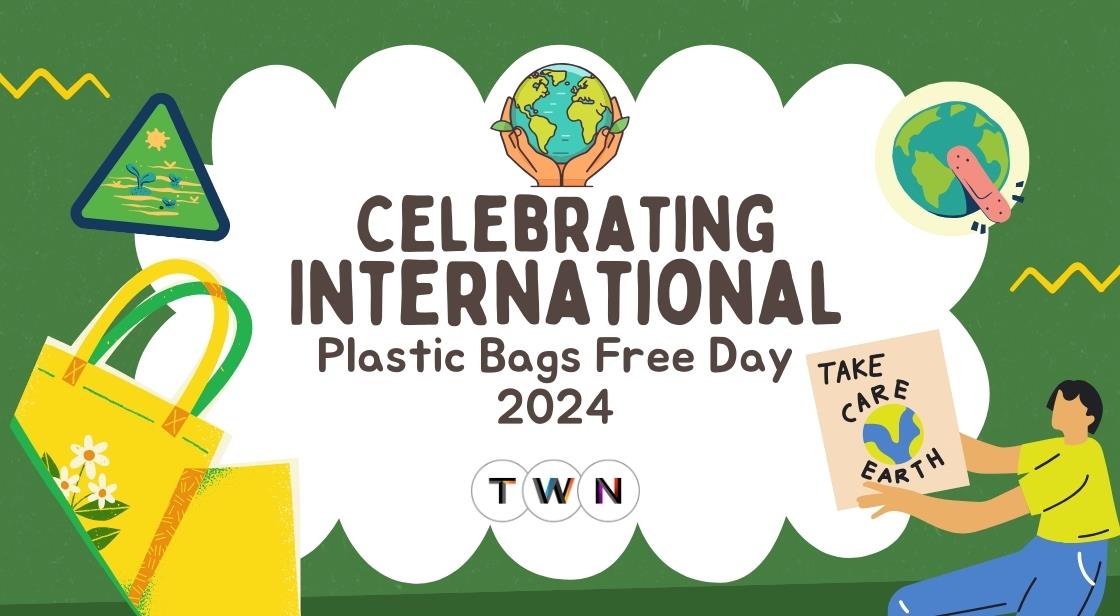Celebrating International Plastic Bags Free Day 2024

Blog Post
Welcome to International Plastic Bags Free Day 2024, a pivotal moment in our global efforts to combat plastic pollution and promote sustainable living. This annual observance, held on 3 July serves as a poignant reminder of the environmental impact of single-use plastic bags and the urgent need for collective action.
In June 2024, the National Geographic Society reported that plastic pollution has reached alarming levels, with an estimated 11 million metric tons of plastic waste entering our oceans each year. Plastic bags, notorious for their durability and widespread use, contribute significantly to this crisis, posing threats to marine life, ecosystems, and human health.
Against this backdrop, International Plastic Bags Free Day assumes greater significance than ever before. It celebrates advancements in global awareness and initiatives aimed at reducing plastic bag consumption. According to recent data countries around the world are implementing legislation and promoting alternative solutions to phase out single-use plastics. This includes bans on plastic bags in retail settings and incentives for reusable alternatives.
This year’s observance underscores the progress made by communities, businesses, and policymakers in embracing sustainable practices. It highlights the role of grassroots movements and innovative solutions that empower individuals to make eco-conscious choices in their daily lives.
Join us as we delve into the importance of International Plastic Bags Free Day 2024, explore success stories from across the globe, and discover actionable steps to reduce plastic waste. Together, we can pave the way towards a cleaner, healthier planet for generations to come.
Promoting Sustainability on Plastic Bags Free Day 2024
Understanding the Significance of International Plastic Bags Free Day:
Introducing International Plastic Bags Free Day:
International Plastic Bags Free Day is a global initiative dedicated to raising awareness about the environmental impact of plastic bags and promoting sustainable alternatives. Held annually on [date], this day serves as a reminder of the urgent need to reduce our reliance on single-use plastics and adopt eco-friendly practices.
History of International Plastic Bag Free Day
Early Concerns and Initiatives (1960s-2000s)
Plastic bags, introduced widely in the latter 20th century, sparked early environmental concerns dating back to the 1960s. The 1970s witnessed the emergence of environmental movements, prompting initial bans on single-use plastic bags in countries like Denmark and Ireland.
Throughout the 1980s and 1990s, global awareness of plastic pollution grew, leading several nations to implement various restrictions. Despite these efforts, the widespread adoption of plastic bag alternatives remained limited, allowing the global plastic bag issue to persist.
Birth of Plastic Bag Free Day (2008)
In 2008, environmental organizations in Italy, spearheaded by Rezero, initiated a global campaign against plastic bags. They designated July 3rd as International Plastic Bag Free Day, coinciding with the birthday of environmental advocate Sir David Attenborough. The inaugural event primarily aimed to raise awareness and promote plastic bag-free alternatives within Italy, marking a significant beginning for the movement.
Global Movement and Growing Impact (2009-Present)
Since its inception, International Plastic Bag Free Day has rapidly gained traction, spreading to numerous countries across Europe, Africa, Asia, and the Americas. By 2016, the initiative was embraced by the Break Free From Plastic movement, a global coalition of NGOs and activists, significantly amplifying its reach and influence. Today, the day is celebrated in over 100 countries worldwide, marked by diverse events and initiatives organized by individuals, communities, businesses, and governmental bodies.
The Importance of Reducing Plastic Bag Usage:
Reducing plastic bag usage is crucial for environmental sustainability due to its significant ecological footprint. Plastic bags, typically used for minutes, persist in the environment for hundreds of years, contributing to pollution on land and in oceans. They pose serious threats to wildlife, as animals often mistake them for food or become entangled, leading to injury and death.
By reducing plastic bag usage, we can mitigate these harmful effects, conserve natural resources used in their production, and decrease greenhouse gas emissions associated with their manufacturing and disposal.
Highlighting the Global Impact of Plastic Pollution:
Plastic pollution is a global crisis affecting ecosystems, economies, and human health worldwide. Each year, millions of metric tons of plastic waste enter our oceans, endangering marine life and disrupting marine ecosystems. On land, plastic pollution degrades landscapes, contaminates soil and water sources, and poses risks to human health through microplastic ingestion and chemical exposure.
International Plastic Bags Free Day plays a crucial role in raising awareness about these issues. It educates communities, governments, and businesses about the pervasive nature of plastic pollution and encourages collective action to address this environmental challenge.
Raising Awareness and Advocacy:
This day serves as a catalyst for advocacy and policy change, encouraging individuals and organizations to take proactive steps towards reducing plastic bag consumption. It promotes sustainable alternatives such as reusable bags, biodegradable materials, and innovative packaging solutions.
By engaging in educational campaigns, clean-up activities, and policy advocacy, International Plastic Bags Free Day empowers communities to make informed choices and support initiatives that promote a cleaner and healthier environment.
Also Read: What is Environmental Impact Assessment and why It Matters?
Environmental Impact of Plastic Bags:
Plastic bags have become ubiquitous in daily life, but their environmental impact is profound and far-reaching. Understanding these effects is crucial for recognizing the urgency of reducing their usage.
Detrimental Effects on the Environment
Plastic bags contribute significantly to environmental degradation. They are non-biodegradable, persisting in ecosystems for hundreds to thousands of years. As they break down into smaller pieces, known as microplastics, they infiltrate soils and waterways, posing risks to plant life and contaminating freshwater sources.
Impact of plastic bags on Wildlife
The ingestion and entanglement of plastic bags pose severe threats to wildlife. Marine animals mistake them for food, leading to internal injuries, starvation, and death. Sea turtles, dolphins, seabirds, and fish are particularly vulnerable. Plastic bags can also entangle terrestrial animals, causing suffocation or restricting movement, leading to injuries and fatalities.
Threat to Marine Ecosystems
Plastic bags not only harm individual animals but also disrupt entire marine ecosystems. They accumulate in ocean gyres, forming vast floating garbage patches. These patches alter water chemistry, block sunlight from reaching plankton and other marine plants, and disrupt the natural food chain. The toxins absorbed by plastics can also accumulate in seafood, posing risks to human health.
Statistics and Examples
Globally, over 1 trillion plastic bags are used annually, with an average usage time of just 12 minutes per bag. In countries like the United States, less than 5% of plastic bags are recycled, contributing to vast amounts of waste that end up in landfills or as litter. In regions where waste management is inadequate, plastic bags clog drainage systems, exacerbate flooding, and degrade urban environments.
Long-Term Consequences of Plastic Pollution
The persistence of plastic bags in the environment has long-term consequences. Beyond their physical presence, plastic bags release harmful chemicals as they degrade, contaminating soil and water. Microplastics, derived from the breakdown of larger plastic items like bags, infiltrate ecosystems worldwide, threatening biodiversity and ecosystem health.
Urgency for Action
The need for urgent action to reduce plastic bag usage is clear. Governments, businesses, and individuals must collaborate to implement and enforce policies that promote reusable alternatives and discourage single-use plastics. Initiatives such as bans, taxes, and incentives for reusable bags have shown promise in reducing plastic bag consumption and mitigating environmental harm.
By understanding the environmental impact of plastic bags on ecosystems, wildlife, and human health, we can foster a collective commitment to sustainable practices. Choosing reusable bags and advocating for policies that prioritize environmental stewardship are essential steps towards mitigating the devastating effects of plastic pollution for current and future generations.
Success Stories and Global Initiatives:
Initiatives to Reduce Plastic Bag Usage
Various countries and regions have implemented successful initiatives to curb plastic bag consumption. For example, Rwanda implemented a nationwide ban on plastic bags in 2008, becoming one of the first African countries to do so.This initiative has significantly reduced plastic waste and improved environmental cleanliness across the country. Similarly, Bangladesh imposed a strict ban on plastic bags in 2002 after they were found to exacerbate flooding during monsoon seasons. The ban has been effective in reducing plastic pollution and promoting alternative packaging solutions.
Policies Driving Change
Countries like Ireland and Denmark have implemented effective policies to reduce plastic bag usage through taxation. Ireland introduced a plastic bag levy in 2002, resulting in a dramatic reduction of over 90% in plastic bag consumption.
The revenue generated from the levy has been reinvested into environmental initiatives. Denmark followed suit with a similar tax on plastic bags, leading to significant behavioral changes and increased adoption of reusable bags among consumers.
Countries and Regions Making Strides
Australia's Statewide Bans
Several states in Australia, including South Australia, Tasmania, and Queensland, have implemented statewide bans on lightweight plastic bags. These bans have been instrumental in reducing plastic litter and encouraging the use of reusable alternatives. Retailers and consumers have adapted positively to the changes, contributing to cleaner environments and heightened awareness of plastic pollution issues.
European Union Directive
The European Union (EU) has taken a comprehensive approach to tackle plastic pollution, including single-use plastics like bags. The EU Directive on Single-Use Plastics, adopted in 2019, mandates member states to implement measures to reduce plastic bag usage and encourage sustainable alternatives. This directive has prompted widespread action across Europe, fostering innovation in packaging and promoting circular economy principles.
Role of International Organizations and Partnerships
United Nations Environment Programme (UNEP)
UNEP has been instrumental in advocating for global action on plastic pollution through campaigns like the Clean Seas initiative. This program mobilizes governments, businesses, and individuals to reduce marine litter, including plastic bags. UNEP supports countries in developing policies, sharing best practices, and raising awareness about the environmental impacts of plastic waste.
Global Partnerships for Sustainable Development Goals
International partnerships such as the Global Plastic Action Partnership (GPAP) bring together governments, businesses, and civil society to address plastic pollution comprehensively. GPAP works towards achieving the Sustainable Development Goals (SDGs), particularly Goal 14 (Life Below Water) and Goal 12 (Responsible Consumption and Production). By fostering collaboration and innovation, these partnerships facilitate the adoption of sustainable practices and the reduction of plastic bag usage globally.
Community Engagement and Grassroots Movements:
Communities worldwide are actively engaging in grassroots movements to combat the proliferation of plastic bags through innovative solutions and awareness campaigns.
Grassroots Movements: Local communities are spearheading initiatives to eliminate plastic bags by organizing clean-up drives, beach or riverbank clean-ups, and plastic-free events. These movements often mobilize volunteers who are passionate about environmental conservation, aiming to reduce plastic waste and educate the public about sustainable alternatives.
Innovative Solutions: Innovative approaches include the promotion of reusable alternatives such as cloth bags, jute bags, or durable multi-use bags made from sustainable materials. Some communities have implemented bag exchange programs where residents can swap plastic bags for reusable ones, encouraging long-term behavioral change.
Campaigns for Awareness: Campaigns play a crucial role in raising awareness about the environmental impact of plastic bags. These efforts utilize social media, community events, and educational workshops to inform individuals about the consequences of plastic pollution and advocate for sustainable practices. Campaigns often highlight success stories from other regions to inspire action locally.
Impact of Consumer Behavior and Individual Actions
1. Shifting Consumer Behavior: Consumer behavior plays a pivotal role in reducing plastic waste. By consciously choosing reusable bags and opting out of single-use plastics, individuals contribute to significant reductions in plastic consumption. Community-led initiatives often emphasize the power of consumer choices in driving environmental change.
2. Individual Actions: Individual actions, such as refusing plastic bags at stores, carrying reusable bags for shopping, and participating in local clean-up efforts, collectively contribute to reducing plastic waste. These actions not only minimize environmental harm but also foster a sense of responsibility and sustainability within communities.
3. Educational Efforts: Educational programs and workshops educate community members, including children and adults, about the importance of reducing plastic waste. These initiatives empower individuals to make informed choices and adopt sustainable habits in their daily lives. By fostering a culture of environmental stewardship, grassroots movements promote long-term environmental sustainability.
Corporate Responsibility and Innovations:
Corporate responsibility extends beyond profitability to include environmental stewardship. Businesses play a pivotal role in addressing plastic pollution through various initiatives and innovations aimed at sustainability.
Role in Addressing Plastic Pollution:
Businesses are increasingly recognizing their responsibility in tackling plastic pollution. They are implementing strategies to reduce plastic waste throughout their operations and supply chains. This includes minimizing single-use plastics, optimizing packaging materials, and adopting eco-friendly alternatives.
Corporate Responsibility Initiatives:
Many companies have launched corporate responsibility initiatives focused on plastic reduction. This involves setting ambitious goals to decrease plastic usage, increasing recycling rates, and supporting community clean-up efforts. Some companies also engage in partnerships with environmental organizations to advocate for policy changes and promote awareness.
Sustainable Packaging Innovations:
Innovation in sustainable packaging is crucial for reducing plastic waste. Businesses are investing in research and development to create biodegradable materials, recyclable packaging, and compostable alternatives. These innovations aim to maintain product integrity while minimizing environmental impact throughout the product lifecycle.
Promotion of Reusable Products:
Businesses play a key role in promoting reusable products as alternatives to single-use plastics. This includes offering reusable bags, containers, and bottles to consumers, as well as incentivizing their use through discounts or loyalty programs. By encouraging behavior change among consumers, businesses contribute to reducing plastic consumption and waste generation.
Contribution to Circular Economy:
Businesses are transitioning towards a circular economy model, where resources are used efficiently and products are designed for reuse, recycling, or composting. This approach minimizes waste and reduces reliance on virgin materials, thereby lowering environmental footprint. Companies engage in closed-loop systems, where materials are recycled back into production processes, fostering sustainability and economic resilience.
Minimizing Environmental Footprint:
To minimize their environmental footprint, businesses integrate sustainability into core business strategies. This includes adopting energy-efficient practices, reducing greenhouse gas emissions, and implementing water conservation measures. Companies also conduct life cycle assessments to evaluate environmental impacts across their operations and supply chains, identifying opportunities for improvement.
Calls to Action and Future Directions:
Encourage Readers to Take Action on International Plastic Bags Free Day:
International Plastic Bags Free Day is not just about awareness but also about action. Encourage readers to participate actively in this global movement by pledging to reduce their use of plastic bags. Emphasize the significance of individual actions in collectively reducing plastic waste and preserving the environment for future generations. Whether it's refusing plastic bags at stores, opting for reusable bags, or spreading awareness among friends and family, every action counts.
Practical Tips for Reducing Plastic Bag Usage in Daily Life:
Provide practical tips that readers can implement in their daily routines to minimize plastic bag usage:
-
Carry Reusable Bags: Always carry reusable bags when shopping for groceries or running errands.
-
Say No to Plastic: Politely refuse plastic bags at stores and opt for alternatives like cloth or jute bags.
-
Use Multi-Purpose Bags: Utilize multi-purpose bags that can serve various needs, such as carrying lunch or gym essentials.
-
Keep Bags Handy: Keep reusable bags in convenient places like your car or by the front door to ensure you always have them when needed.
-
Spread Awareness: Educate others about the environmental impact of plastic bags and encourage them to join the movement.
Ways to Advocate for Policy Changes and Support Sustainable Alternatives:
Empower readers to advocate for policy changes and support sustainable alternatives on a broader scale:
-
Petition and Lobby: Sign petitions and lobby local authorities or governments to implement policies that restrict or ban single-use plastic bags.
-
Support Legislation: Support legislators who prioritize environmental issues and advocate for sustainable practices.
-
Promote Alternatives: Encourage businesses and communities to adopt and promote sustainable alternatives to plastic bags, such as biodegradable options or reusable packaging.
-
Engage with Businesses: Patronize businesses that prioritize environmental sustainability and encourage them to reduce plastic use.
Conclude with a Message of Hope and Empowerment:
Wrap up the article with a message that inspires hope and emphasizes the collective impact of individual actions:
-
Collective Impact: Highlight how individual actions, when combined, can create a significant positive impact on the environment and reduce plastic pollution.
-
Empowerment: Empower readers by showing them that their choices matter and can contribute to a cleaner and healthier planet.
-
Hope for the Future: Express optimism about the future, noting the progress being made globally in reducing plastic waste and the potential for further positive change.
-
Call to Persist: Encourage readers to continue their efforts beyond International Plastic Bags Free Day, fostering a long-term commitment to sustainable practices.
By providing clear calls to action and practical tips, along with advocating for policy changes and offering a message of hope and empowerment, readers will be motivated to actively participate in International Plastic Bags Free Day and contribute to a more sustainable future.
Conclusion:
International Plastic Bags Free Day 2024 celebrates collective efforts towards a plastic-free future. By raising awareness, supporting legislation, and adopting sustainable alternatives, we can mitigate the environmental impact of plastic bags. Let’s continue to work together to preserve our planet for future generations. Join the movement today and pledge to reduce, reuse, and recycle for a cleaner and greener tomorrow.
You May Like
EDITOR’S CHOICE












